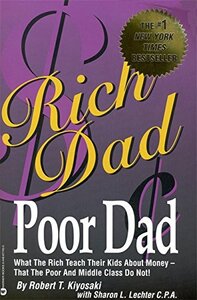Take a photo of a barcode or cover
2.04k reviews for:
Rich Dad, Poor Dad: What the Rich Teach Their Kids about Money – That the Poor and Middle Class Do Not!
Robert T. Kiyosaki
2.04k reviews for:
Rich Dad, Poor Dad: What the Rich Teach Their Kids about Money – That the Poor and Middle Class Do Not!
Robert T. Kiyosaki
1.5/5
The illiterate of the 21st century won't be those who can't read and write, but those who can't learn, unlearn, relearn (Alvin Toffler, futurist)
After years in my TBR, I finally went for it. I'm sorry to say I found it quite disappointing: the insights in this book are in part self-evident, in part questionable. Perhaps, I waited too long to read it and it just didn't age well. Overall, I think it may be more helpful as a general self-help book, rather than a guide to managing money. I feel like I should also point out that it's obviously dangerous to take financial advice from a book from the 1990s, and would strongly advise again using any takeaways from the book as financial advice for the 2020s. My comments are in parentheses.
Main points:
- Pay ourself first each month. Even before your rent and bills, take out a small portion of your salary each month. Spend it on medium-to-high risk stocks or bonds that will then offer a high reward. [Questionable] Spend what you can afford to lose. [Still, leading to a very good point]
- Learn what you need to learn. Keep filling obvious gaps in your knowledge and skill base. Rich people tend to know a little about a lot of things and pay experts for the details. They learn only what they need, then go out and apply it [Reckless financial advice, but potentially useful if interpreted in terms of more general work advice. We don't have to become experts at everything, it's better to focus on a niche and rely on experts to fill our gaps]
- "When emotion goes up, intelligence goes down." [Debatable] Work on controlling your thoughts and emotions. [Sensible] Step back, consider, and take a long-term view. [Makes sense] Write down your financial fears, then throw them away [Plain stupid]
Actionable advice: Only spend what you can afford to lose.
The illiterate of the 21st century won't be those who can't read and write, but those who can't learn, unlearn, relearn (Alvin Toffler, futurist)
After years in my TBR, I finally went for it. I'm sorry to say I found it quite disappointing: the insights in this book are in part self-evident, in part questionable. Perhaps, I waited too long to read it and it just didn't age well. Overall, I think it may be more helpful as a general self-help book, rather than a guide to managing money. I feel like I should also point out that it's obviously dangerous to take financial advice from a book from the 1990s, and would strongly advise again using any takeaways from the book as financial advice for the 2020s. My comments are in parentheses.
Main points:
- Pay ourself first each month. Even before your rent and bills, take out a small portion of your salary each month. Spend it on medium-to-high risk stocks or bonds that will then offer a high reward. [Questionable] Spend what you can afford to lose. [Still, leading to a very good point]
- Learn what you need to learn. Keep filling obvious gaps in your knowledge and skill base. Rich people tend to know a little about a lot of things and pay experts for the details. They learn only what they need, then go out and apply it [Reckless financial advice, but potentially useful if interpreted in terms of more general work advice. We don't have to become experts at everything, it's better to focus on a niche and rely on experts to fill our gaps]
- "When emotion goes up, intelligence goes down." [Debatable] Work on controlling your thoughts and emotions. [Sensible] Step back, consider, and take a long-term view. [Makes sense] Write down your financial fears, then throw them away [Plain stupid]
Actionable advice: Only spend what you can afford to lose.
fast-paced
informative
slow-paced
informative
slow-paced
Man explains to child why it’s actually good he makes him work for free.
Actual review:
Has some questionable ethics. At one point it essentially endorses the idea that workers that are underpaid deserve it then back tracks then agrees again.
Save your time and read the first half of this book then stop. The latter half is him simply saying how he got rich in the real estate business back when houses cost 60k…
Actual review:
Has some questionable ethics. At one point it essentially endorses the idea that workers that are underpaid deserve it then back tracks then agrees again.
Save your time and read the first half of this book then stop. The latter half is him simply saying how he got rich in the real estate business back when houses cost 60k…
Some very useful perspective on money surrounded by a somewhat unpalatable lack of appreciation for other kinds of success.
funny
informative
inspiring
medium-paced
Book about advice author got from 2 men in his life
- His real Poor Dad who was highly educated man who never seemed to have enough money
- His friends Dad who was rich and taught him valuable lessons about handling money.
Packed full of advice on how to think differently about money and getting it to work for you rather than you work for money. This is through smart real estate purchases and investments.
A very easy to read book that I'll need to read a few times to actually take some action.
- His real Poor Dad who was highly educated man who never seemed to have enough money
- His friends Dad who was rich and taught him valuable lessons about handling money.
Packed full of advice on how to think differently about money and getting it to work for you rather than you work for money. This is through smart real estate purchases and investments.
A very easy to read book that I'll need to read a few times to actually take some action.
Gave some good advice but for someone who has never been taught anything about money, it would have been helpful for more tactics and how tos and what you should do if you want to go into real estate or stocks. He makes it sound so easy just buying a house without a lot of money. It was also redundant. The summary sections were too much.





